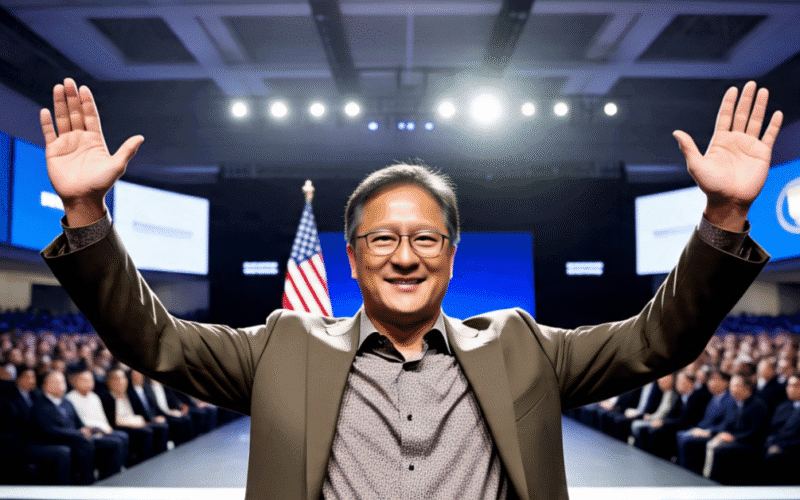Nvidia CEO Jensen Huang praises President Trump’s re-industrialization efforts, highlighting their impact on U.S. manufacturing and AI leadership. Discover how these policies are reshaping the tech landscape.
Table of Contents
- Introduction
- Huang’s Endorsement of Trump’s Policies
- Impact on U.S. Manufacturing
- Reversal of Biden-Era Export Controls
- Global Partnerships and AI Infrastructure
- Risks and Geopolitical Considerations
- Conclusion
- FAQs
Introduction
In a significant development for the U.S. tech industry, Nvidia CEO Jensen Huang has publicly endorsed President Donald Trump’s re-industrialization policies, describing them as “very visionary.” This endorsement underscores the administration’s efforts to bolster domestic manufacturing and technological leadership.(Reuters)
Huang’s Endorsement of Trump’s Policies
During a visit to Norrköping, Sweden, where he received an honorary doctorate, Huang lauded Trump’s commitment to revitalizing U.S. manufacturing. He emphasized that the administration’s policies have been instrumental in enabling American technology companies to succeed globally. (Reuters)
Impact on U.S. Manufacturing
Nvidia has announced plans to invest hundreds of billions of dollars in U.S.-based manufacturing over the next four years. This move aligns with Trump’s “America First” policy, aiming to reduce reliance on foreign supply chains and strengthen domestic production capabilities. (The White House, Financial Times)
Reversal of Biden-Era Export Controls
Huang criticized the previous administration’s export controls on AI chips to China, labeling them a “failure” that cost U.S. companies billions. He praised Trump’s initiative to reverse these restrictions, highlighting the importance of global cooperation in technology. (The Times of India, Reuters)
Global Partnerships and AI Infrastructure
Nvidia is expanding its global footprint through partnerships with companies like Ericsson and AstraZeneca to develop AI infrastructure using its latest data center technology. These collaborations are part of a broader strategy to position the U.S. as a leader in AI development. (Reuters)
Risks and Geopolitical Considerations
While the re-industrialization policies have garnered support, they also come with risks. Critics caution that tariffs and export controls may lead to higher costs and disrupted supply chains. Additionally, Nvidia’s operations in politically sensitive areas like China pose challenges amid escalating tech tensions. (Reuters, WSJ)
Conclusion
Jensen Huang’s endorsement of President Trump’s re-industrialization policies highlights a pivotal moment for the U.S. tech industry. As Nvidia invests heavily in domestic manufacturing and expands its global partnerships, these policies are reshaping the technological landscape, positioning the U.S. as a formidable leader in AI and advanced manufacturing.(Reuters)
FAQs
Q1: What specific policies did Trump implement to support U.S. manufacturing?
A1: President Trump introduced tariffs on imports and reversed certain export controls to encourage domestic production and reduce reliance on foreign supply chains.
Q2: How has Nvidia responded to these policies?
A2: Nvidia plans to invest hundreds of billions in U.S.-based manufacturing and has formed global partnerships to develop AI infrastructure, aligning with the administration’s goals.(The White House)
Q3: What are the potential risks associated with these policies?
A3: Critics argue that tariffs and export controls could lead to higher costs, supply chain disruptions, and strained international relations, particularly with countries like China.
